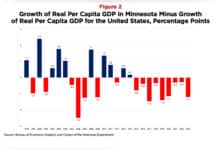(Center of the American Experiment) — The Build Back Better Act, which has gone from $3.5 trillion to $1.75 trillion, is now set to include a provision that raises the SALT deduction cap from $10,000 to $80,000 and essentially gives a huge tax break to the rich.
What is the SALT cap?
The State and Local Taxes deduction allows taxpayers to deduct from the federal government certain taxes paid to state and local government. The 2017 Tax Cuts and Jobs Act put a limit of $10,000 on that and restricted the type of taxes that can be deducted. Democrats in the House have proposed to raise that cap to $80,000 through 2031. This is up from an earlier amendment that proposed raising the cap to $72,500.
This, however, goes against everything that the Democrats have been standing up for — huge taxes on the rich. Data shows that expanding or repealing the SALT cap will only benefit one group of people — rich taxpayers in progressive states. Expanding the SALT cap is one of the most regressive provisions on the bill.
Tax cuts for the rich
Generally, the itemized deduction is used by high-income individuals in high tax states. Most middle- and low-income taxpayers utilize the standard deduction. So, for this reason, raising the SALT cap will mostly benefit rich individuals, while costing the U.S. government billions.
In an earlier analysis, the Tax Foundation, for example, estimated that raising the SALT cap to $72,500 would in fact deliver 80% of benefits to individuals with incomes over $200,000.
Updated @TaxFoundation distributional estimate for raising the SALT cap to $72,500. About 80% of the benefit goes to those earning over $200K.
Biggest winners are those earning between $250K and $1M. https://t.co/DuSWgcIsU4 pic.twitter.com/xpyNtrGgjQ
— Garrett Watson (@GS_Watson) November 3, 2021
Similar — albeit more excessive — results have been estimated for fully repealing the SALT cap. In fact, the only solution that would not be regressive would be a full repeal of the SALT deduction itself. The Committee for Responsible Budget estimates that repealing the SALT deduction would actually raise as much as $50 billion per year.
A lot — if not all — liberal-leaning researchers do agree on the regressivity of expanding or repealing the SALT cap. But Brookings Institution puts it best when it says,
“At best, the SALT deduction is a warped way to do social policy; at worst it is a politically-motivated handout to the richest people in the richest places. Either way, it is bad policy — especially at a time of rising inequality.”
Democrats have long touted themselves as the party trying to raise taxes on the rich in order to benefit struggling American households. It is not only bad policy, but also hypocritical of them to push so heavily for a tax break that primarily benefits the rich.











